Friends of the JC Raulston Arboretum Newsletter
Spring 2021 – Vol. 24, No. 1
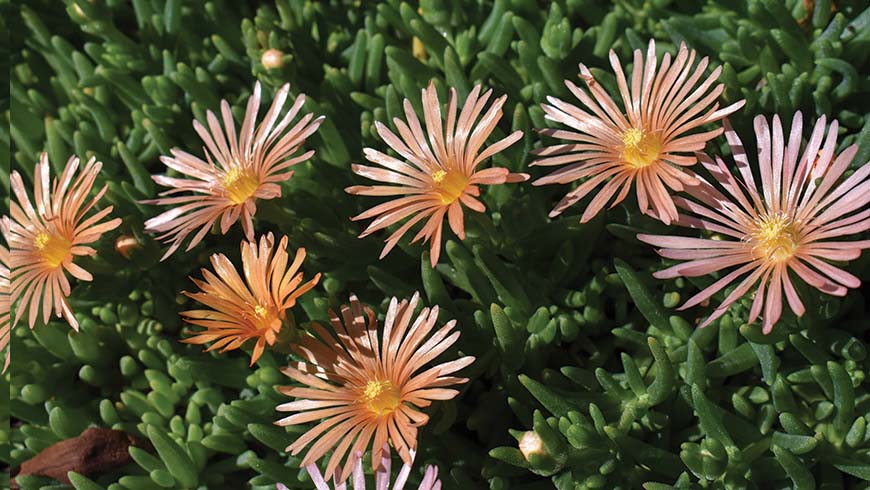
Director's Letter
Greetings from the JC Raulston Arboretum
By Mark Weathington, Director
What a difference a year makes. A little more than a year ago we were breaking attendance and membership records every month. We had just come off the wildly successful Moonlight in the Garden in November 2019 and were looking forward to continuing to welcome even more folks to the garden. Instead, we closed our gates for a full year and set records for virtual programs instead. I somehow managed to give 43 weeks of programming, and our attendance just kept growing. We made new friends from Sally in Seal Rock, Oregon, to Dina in Cape Canaveral, Florida, and everywhere in between thanks to a packed calendar of online programs. Don't tell anyone, but I think there might be something to this video-conferencing technology.
We managed to distribute more plants than we ever had before, provided more educational opportunities, reached a broader audience, and shared our passion for horticulture in ways we had never even considered a handful of months ago. If you told me that we would be hosting eight symposia in 12 months, I would have said it wasn't possible. I've learned my lesson—never bet against the JCRA staff! The trick now is to continue the high level of research, display, and education that we have always strived for on-site and the incredible online presence we developed in 2020. Our weekly, free, online programming has been revamped so it can continue as we reopen and our YouTube channel will be a source of great material that we add to regularly. If you're not a subscriber, check it out for great information whether you want to know about vermicomposting, perennials for shade, or just about any other horticultural topic.
As I spent 2020 continually being amazed at the dedication and hard work of the JCRA team, I was gratified that so many of you reached out to share your experiences with the staff and provide kudos for a job well done over and over. Many of you expressed that through e-mails and phone calls, others by registering for every program we could provide, and still others by upgrading your memberships to higher levels. Your support enabled us to keep the entire staff on board and ready to grow the impact of the Arboretum. The JC Raulston plant breeding initiative is just one example of the many ways we'll be growing in an effort to support you, NC State University, and the nursery industry.
It seems fitting that this growth and synthesis of the traditional with the new should happen right as we reach the milestone of our 45th anniversary. This year, we hope to invest in the staff who helped us thrive in 2020 and in new folks to bring us further along. We plan to invest in technology to keep us connected as we continue to navigate this brave new world. And, of course, we plan to invest in the gardens—ultimately, the reason we are here at all. As you come back, you'll see changes large and small, and you can expect even more over the coming few years. Forty-five certainly isn't middle age for a garden; we are just getting started.
Annual Report
2020 JC Raulston Arboretum Annual Report
There are many people to thank for their support in 2020. In an effort to conserve resources, the full 2020 annual report is offered on the JCRA Web site at https://jcra.ncsu.edu/publications/annual-reports/ instead of printed copies. A few highlights of 2020 are included below.
Revenue*

Expenditures*
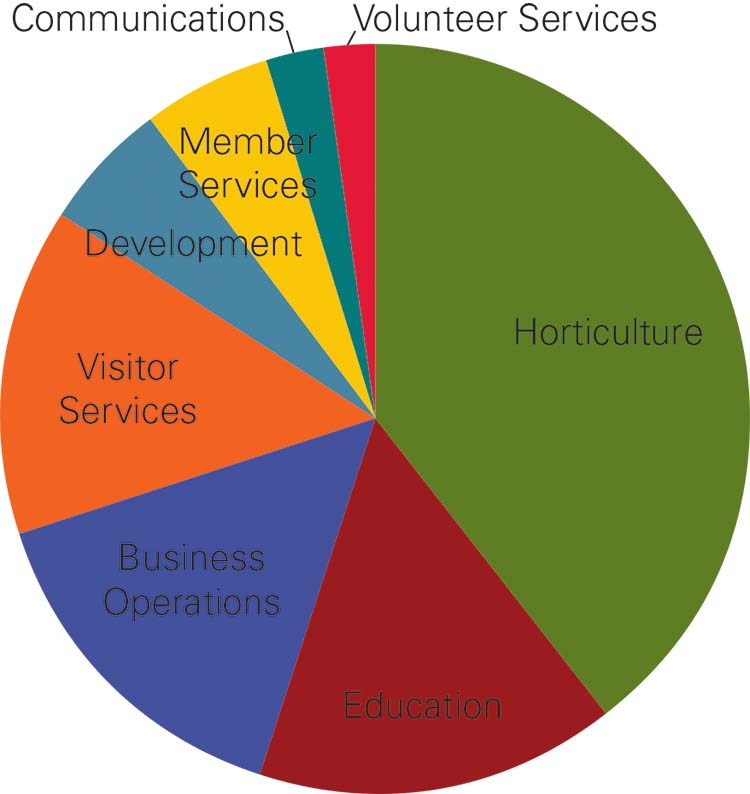
*July 2019 through June 2020
YouTube
| 112,158 | Views (up 197% compared to 2019) |
| 34,434 | Watch time in hours (up 278% compared to 2019) |
| 1,359 | New subscribers (up 343% compared to 2019) |
Plant Collections and Distributions
| 1,259 | New accessions |
| 7,901 | Taxa in living collection |
| 16,435 | Plants distributed to members, public, other gardens, and nurserymen |
Friends of the Arboretum Annual Plant Distribution
| 645 | Participating membership households |
| 1,001 | Bags picked up |
| 487 | Bags picked up on Friday |
| 514 | Bags picked up on Saturday |
Volunteering
| 6,752 | Volunteer hours |
| 6 | Months volunteers worked |
| 207 | Volunteers with recorded hours |
| Volunteers with over 200 hours |
|
| Cathy and Larry Mack Trish and Kerry MacPherson Dianne Schaffer Mary Beth Rehm Lynne Taylor |
|
Membership
| 2,036 | Membership households |
| 3,185 | Total members |
| 27 | States where members live |
Horticulture
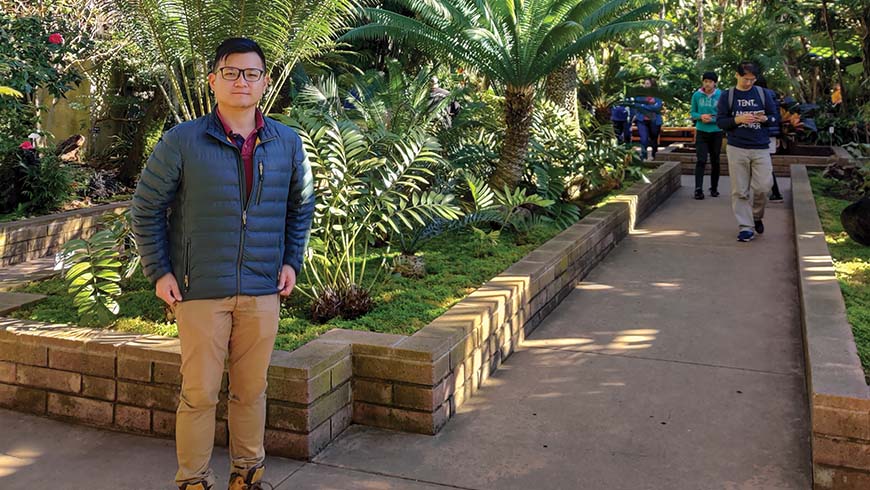
It's All About the Plants
By Mark Weathington, Director
"It's all about the plants." Those were some of the first words former JCRA director Denny Werner, Ph.D., told me when I joined the JC Raulston Arboretum team in 2007. That motto was the rallying cry of the Master Plan committee as they helped develop the plans which have moved us forward over the last 15 years. As an avid plant nerd, I loved the idea that we were all about plants. Those words have helped inform decisions we've made over the years. It has been the through-line since J. C.'s days when he started what would become his namesake Arboretum 45 years ago.
In the early years, J. C. helped spread plants around, making sure the right plants got to the right people. While he was credited with introducing dozens (hundreds?) of plants to horticulture, he was usually the conduit rather than the actual inventor. Of course, some of the JCRA's most successful introductions from its early years were thanks entirely to J. C. His 1985 trip to the Republic of Korea led to the introduction of probably the most widely grown Japanese snowbell, Styrax japonicus 'Emerald Pagoda', as well as the widely planted evergreen hedging viburnum, Viburnum awabuki 'Chindo'. A rarity under J. C. was the actual planned hybridizing of the Asian and American sweetshrubs by Richard Hartlage, which resulted in the still popular Calycanthus ×raulstonii 'Hartlage Wine'.
Despite the lack of a formal breeding program, the JCRA's wild collections, evaluations, and horticulture staff's keen eye for superior plants has led to many new plant introductions. By our very conservative count, about five dozen plants have been introduced by the Arboretum. That number does not include the many species of plants which were first introduced to horticulture by the JCRA, only those selections which have been named and released. These introductions include plants which predated the Arboretum such as the 1956 Lagerstroemia fauriei 'Fantasy' from the U.S. National Arboretum, as well as new selections which have proven to be reliable performers like Viburnum obovatum 'Raulston Hardy'.
Nearly 30 years after the JCRA's beginning, Denny Werner, a true plant breeder, came on board. During his tenure as director and then as director emeritus, Denny introduced many game-changing plants through the Arboretum, including the first dwarf, sterile butterfly-bushes like Buddleia 'Blue Chip' and 'Miss Ruby', as well as breakthroughs in redbud breeding including most recently Cercis canadensis 'NC2015-12' Golden Falls and 'NC2016-2' Flame Thrower. Even after retirement, Denny continues to support, advise, and share his career-spanning knowledge to help move the JCRA forward.
As the start of a new decade and our 45th anniversary, 2021 sees the JCRA primed for exciting new endeavors in the plant breeding realm. Thanks to the support of the North Carolina Nursery and Landscape Association, other stakeholders, and NC State University's Department of Horticultural Science, a new faculty member was hired to work closely with the Arboretum to develop landscape plants which meet the needs of our modern landscapes and to train the next generation of plant breeders. Hsuan Chen, Ph.D., comes to us from Taiwan via Oregon State University where he received his doctorate working with native North Carolinian Ryan Contreras, Ph.D., one of many alums to emerge from Tom Ranney's breeding program.
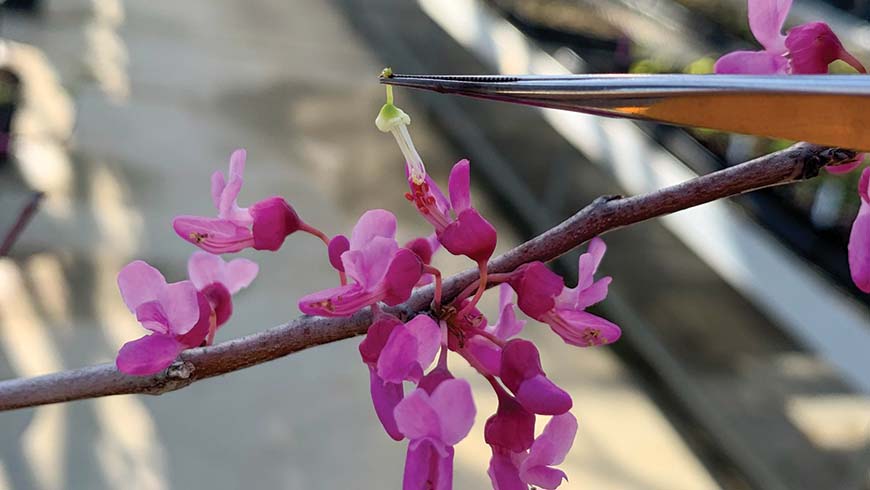
Hsuan has a lifelong interest in breeding, starting as a child in Taiwan breeding guppies before discovering plants. His plant breeding skills range from the traditional to next generation technologies including ploidy manipulation, cytogenetics, and molecular marker-assisted selection with the goal of developing plants that need fewer inputs, are novel, environmentally friendly, and are efficient in production. Hsuan will continue Denny Werner's work with redbuds and work closely with Tom Ranney, Ph.D., as well, utilizing the JCRA's and Juniper Level Botanic Garden's extensive germplasm collections.
In order to facilitate Hsuan's work and expand the JCRA's trials, land at NC State's Lake Wheeler Research Farm was designated as the JC Raulston Arboretum Research Farm. Field preparation and deer fencing work, funded in part from the J. Frank Schmidt Family Foundation and from Tom Ranney's research program, is underway with the hope of planting this spring or fall at the latest. Post-doc Nathan Maren, Ph.D., has been leading the charge in getting phase one of the Research Farm up and ready for planting. In the long-term, we anticipate the Research Farm to be a center of woody landscape plant breeding hosting Field Days, educational programming, and training students and professionals alike. At 45, the JC Raulston Arboretum is still expanding what it means to be "All about the plants."
Cercis canadensis subsp. mexicana 'Bonita'
Occasionally, a plant disappears from the Arboretum because of death or it is removed to renovate an area and is not re-planted. It is often easy to go to a nursery to replace the plant, but sometimes the plant has disappeared from the market or never got a toehold in any nurseries. Usually, when this happens, we move on and plant something else to evaluate. In the case of a JCRA introduction, though, we like to make sure it is represented in our collection.
In the early 1990s, J. C. took several collecting trips to Mexico with John Fairey and Carl Schoenfeld of Yucca-Do Nursery. Perhaps on one of those excursions he brought back Mexican redbud seeds or acquired a plant through other sources. At any rate, he named one of the plants Cercis canadensis subsp. mexicana 'Bonita' for its small, round, extra-glossy leaves with rippled, undulate leaf margins. Records on this selection are murky so we are unsure as to its origination, but at some point, it was lost from the JCRA.
We certainly felt that we should have this JCRA introduction as part of the collection since we're a nationally accredited Cercis collection holder. It has taken many years, but we were finally able to track a source down in Belgium in 2020 and reacquire scion wood for grafting. We hope to be able to replant 'Bonita' soon and share it again with other gardens and nurseries to reestablish it in the United States.

New Choice Plants
By Douglas Ruhren, Gardens Manager
Two new plants have entered the Choice Plants program. They are Magnolia 'Serendipity' (evergreen magnolia) and Osmanthus heterophyllus 'Kaori Hime' (fragrant princess holly tea-olive). The program is a joint effort between the JCRA and the Johnston County Nursery Association (JOCO).
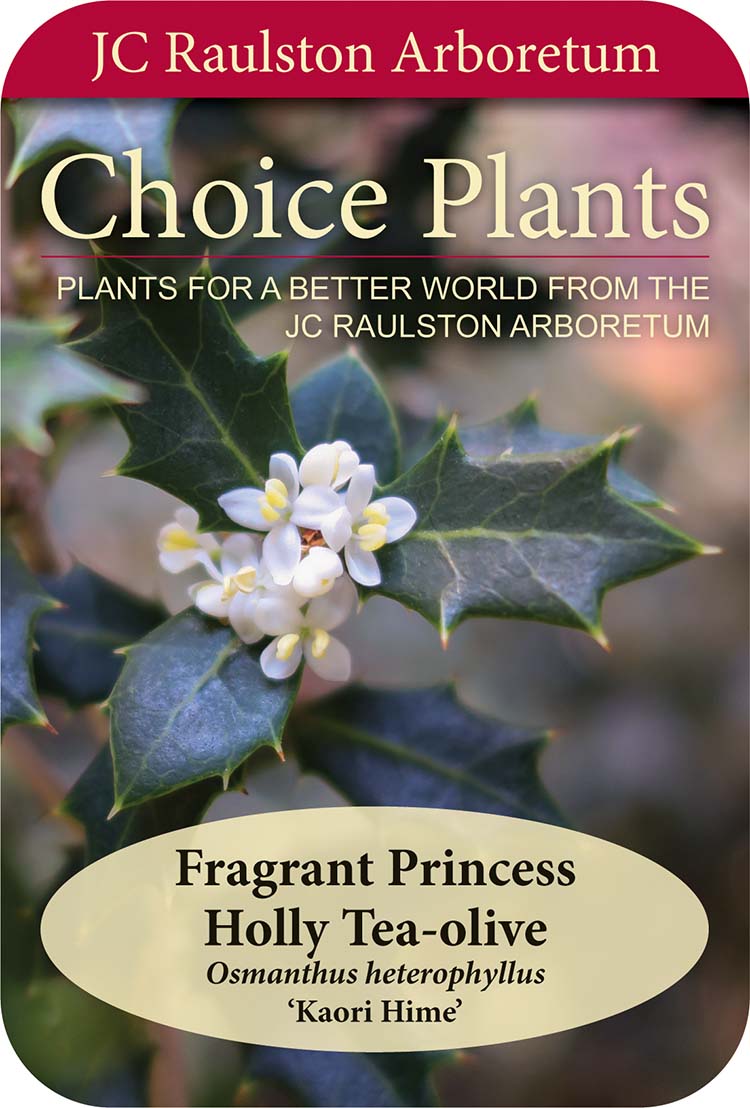
'Serendipity' is a hybrid evergreen magnolia with leaves that run about 3" long and 1" wide. Think banana shrub: its old name was Michelia figo. The genus Michelia has now been merged with the genus Magnolia, making Michelia obsolete. Like the species, 'Serendipity' is a moderately dense shrub with huge numbers of flowers in mid-spring and is hardy to zone 7. A feature that should not be overlooked is the gorgeous, velvety, chestnut brown flower buds that are present all fall and winter. One or two ½" buds are present in each leaf axil on the previous year's growth. The aspect is much like a pussy willow of a different color. Winter stems would be an excellent addition to a flower arrangement.
'Kaori Hime' is the correct cultivar name for this Japanese cultivar of holly tea-olive, Osmanthus heterophyllus. 'Kaori Hime' translates to "fragrant princess." The dark green, holly-like leaves are indeed tiny, usually ranging from ½" to ¾" long. The internodes are likewise short; usually just ½" long. Despite this, it easily puts on 4" or more of new growth each year. True to its name, 'Kaori Hime' has highly fragrant white flowers each fall; a fine fragrance, but different from the fragrance of Osmanthus fragrans. Osmanthus heterophyllus is hardy in zone 6 and thrives in zone 7, so it is reliably winter hardy here. It is a shrub that's very likely to be untouched by deer.
Both plants thrive in full sun or shade and are of very easy culture. Look for these tags at your local garden center. Purchases of these plants supports both JCRA and JOCO!
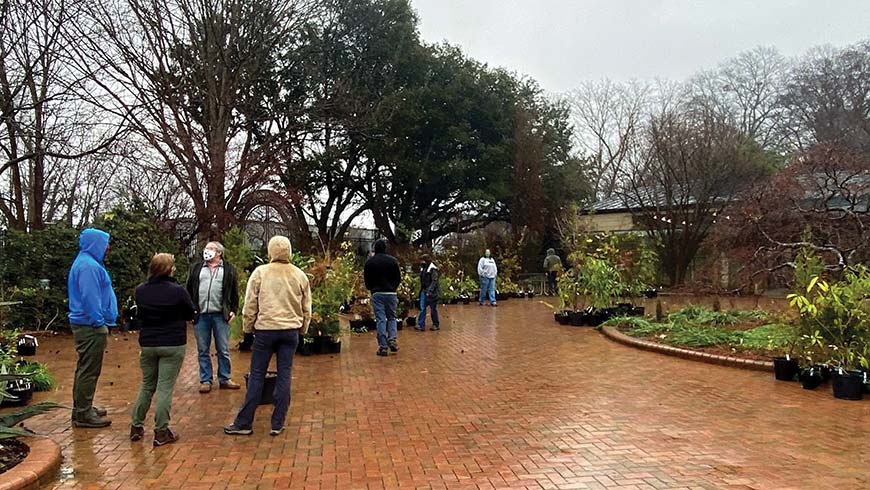
Sharing the Wealth
By Mark Weathington, Director
Like everyone else, we missed the interactions with our peers and colleagues during 2020. That's why we decided to reach out to regional gardens and invite them in for a nursery clean out. It all started with our annual nursery inventory. As we were progressing through the first of eight houses, we realized that we had some plants which were unlikely to ever get planted, whether because of lack of space or time, because we had already evaluated the plant, or because it didn't spark joy with us (perhaps too much Marie Kondo during isolation). At any rate, many of these specimens were simply too good to toss in the compost pile.
We realized that these plants should go to other public gardens so the genetics would be available to researchers and breeders in the future. With that in mind, we contacted gardens throughout the Carolinas and Virginia and put the word out that we would have plants available for our colleagues. Friends from the other Triangle university gardens came by as did folks from Riverbanks in South Carolina and from across Virginia, including Virginia Tech, Lewis Ginter Botanical Garden, and Norfolk Botanic Garden, to name a few. Altogether, we had at least five university gardens, four botanic gardens, and several park systems come to pick up plants and check out our nursery operations.
The JCRA holds an unusual position among botanic gardens. Most gardens' primary horticultural objectives include acquiring and displaying plants. Many also are involved with studying them and conserving plants. The JCRA is one of the rare gardens that exists to not only perform these typical tasks, but, just as importantly, to disseminate and share the plants. In a typical year, we receive dozens of requests from researchers for samples from our collections for analysis; requests from nurserymen for propagules like seed, cuttings, and scions for grafting; inquiries from other botanical institutions to develop their own collections; and asks from breeders looking to expand the genetics in their programs. Wherever possible, we fulfill all these requests, often at not insignificant cost in terms of staff time and funds.
We also serve as best we can as a nexus and connector of people with similar interests or who can support each other. A somewhat unusual example from recent years came from a truffle producer in the N.C. mountains. As he explained, truffles only grow on the roots of certain trees, many of which are not suitable for areas outside their traditional ranges in Europe. He was looking for hardier forms of some of the traditional oaks as well as different growth forms. While I was presenting on the JCRA's evergreen oak evaluations at an International Oak Society meeting, I met a Frenchman who said he could supply acorns from the most northern range of these oaks. I made the connection between the two and have helped the truffière find other tree species to experiment with as truffle hosts. While outside of traditional horticulture, connecting people in an effort to support the nursery industry is part and parcel of what we have always done. As an unexpected benefit, we are often gifted with unusual seedlings from our truffle producing friend. No truffles yet, though.…
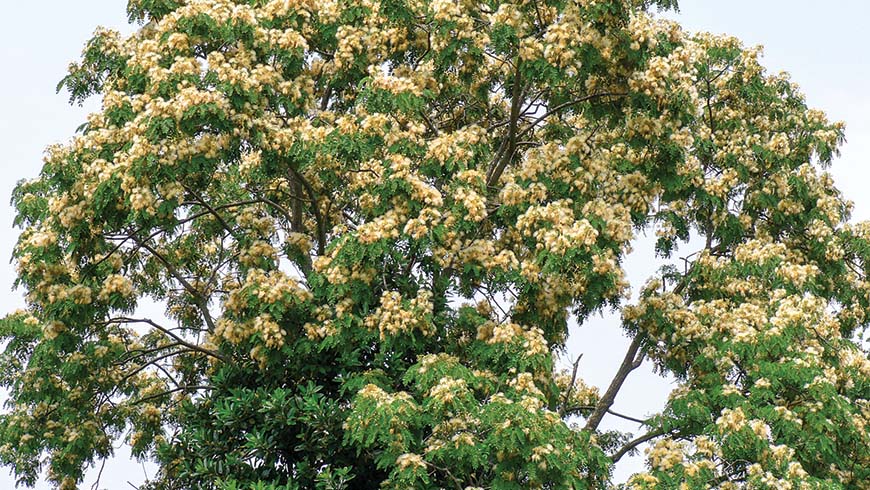
Taking today as an example, I have responded to a grower in Louisiana about cold-hardy(ish) cycads we have grown and where some might be procured, a student in Sweden interested in seeds of the hardy orchid-tree (Bauhinia forficata) for a research project, a grower in the Netherlands wanting grafting material of the Korean mimosa (Albizia coreana, photograph above), and the Magnolia Society International's seed distribution program for help in importing magnolia seed from Europe. I've also responded to a question from the United Kingdom regarding Japanese plant nomenclature resources and a question from Germany about helping with Liriope and Ophiopogon research. That makes for a pretty typical day at the JC Raulston Arboretum.
Whether we are sending thank-you plants home with participants in a program, having a plant sale or rare plant auction, sharing with our botanical colleagues, or shipping germplasm to researchers and nurserymen, what goes out of our gate is as important, if not more so, than what comes in. Diversifying the American landscape by sharing our plants, our passion, and our knowledge began with J. C. Raulston 45 years ago and continues through everything we do today.
Arboretum Updates
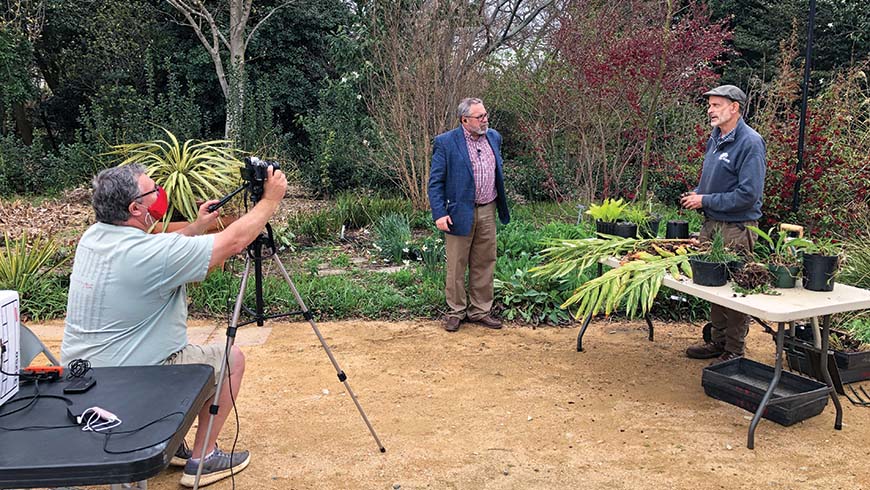
Day of Giving
By Carly Dresson, Development Assistant
Thank you to all our supporters who participated in this year's third annual NC State Day of Giving! The JC Raulston Arboretum's Advisory Board funded a challenge to receive 101 gifts to the General Fund, and our supporters met that goal just halfway through the day. We then set a new goal to double that challenge with 202 gifts, and we met that again. We received over 202 gifts, reaching nearly $50,000!
The day was filled with excitement and an engaging expanded midweek program hosted by Mark Weathington, with staff, former directors and interns, renowned horticulturists, and other special guests. The passion you share for the JCRA was felt and seen by all across the university. Your unprecedented level of support set an example for how others may choose to engage with their supporters for future Day of Giving events!
Other transformational gifts received were $50,000 for the Juniper Level Botanic Garden Endowment, $275,000 planned gift to support JCRA interns, $500,000 planned gift for plant breeding, and 89 memberships.
If you are interested in learning more about how to make a gift for future NC State Day of Giving events, contact Alycia Thornton at alycia_thornton@ncsu.edu. Thank you again to all our remarkable donors. The JCRA will continue to grow and prosper thanks to your generosity!

Blooming During Times of Distress: A Look into the Arboretum During Lockdown
By Sana Sheikh, Programs and Education Assistant
The JC Raulston Arboretum is celebrating its 45th anniversary this year! With our anniversary upon us, there's no better time to reminisce about how far we've come. While the Arboretum has always stayed true to our mission of supporting and educating our community, the way we've done programs has drastically changed. During our early years, some of our first lectures were offered at the Arboretum itself using white sheets and slides, with relatively small groups. Now, thanks to the pandemic and moving our events online, we've expanded our events to sizes and audiences that were previously unachievable with our limited resources.
When the lockdown officially started in March 2020, the Arboretum didn't miss a single step. While there was some adjusting involved in shifting to online operations, the flexibility of our team and our members helped tide us through the sudden change without any notable mishaps. We even had an ongoing in-person class in March that finished off with digital sessions.
It goes without saying that going online has brought an astounding amount of change to the Arboretum—and an astounding amount of growth, too. Classes have always been limited by how much space in the Ruby C. McSwain Education Center was available. Now, we've put classes into the hands of more people than ever. This year's winter Gardening in the South had over 600 registrations and several of our midweek programs hit our 300 maximum participant limit!
An extra perk is that people from outside of North Carolina or who otherwise can't physically reach the Arboretum are now able to tune in. Kari Wilkinson said, "I was able to save three hours in travel time and learned so much. Would not have come under pre-pandemic circumstances, but virtual makes it so accessible." Jonnie Combs from the 2009 Master Gardener class, who is currently at the coast, said "I am in Dare County and just wanted to let you know how much I enjoy the presentations! I know it takes a lot of work from everyone there to provide all of these excellent learning opportunities and wanted to let you know how much I appreciate all those who make it happen!"
Needless to say, this year has been an enlightening one for the Arboretum. Looking towards the future, we're hoping to combine in-person and online aspects for future classes and events. While this won't necessarily be possible for workshops, there are plenty of educational programs and public events that could be livestreamed or have other online components. By offering more options to tune in, the Arboretum hopes to reach an even wider breadth of gardeners to educate and spread the joy of plants.
While our ways to educate our audience changes and grows even more accessible, the Arboretum's mission has always been to enrich and unite our community. It is our members, old and new, that have helped us grow to unprecedented heights. The future has exciting things in store for us, so stay tuned!
Development

Outgoing and New Board Members
By Carly Dresson, Development Assistant
The JC Raulston Arboretum is excited to announce the addition of ten new Advisory Board members. With the exciting news of new members, I also wanted to recognize two board members who have finished their terms. The Advisory Board's purpose is to advise and assist the JC Raulston Arboretum director in the development and management direction of the Arboretum and to ensure the success of the institution in pursuit of its short- and long-range goals. I am thrilled with the direction we are headed and thankful for the guidance and support the Advisory Board members provide.
Outgoing Advisory Board Members
Phil Dark
Phil is the owner of Oakmont Nursery and is a longtime member and donor, who served three terms as a member of the Advisory Board. Phil understands the need for philanthropy and wants to share his message of investing in horticulture and research with others. Even as his time on the board has come to an end, he wants to continue to stay involved and encourage others to do the same.
David Johnson
David is the owner of Johnson Nursery and is a longtime donor who served three terms as a member of the Advisory Board. David truly believes in philanthropy and sees it as an investment in the community. We are extremely grateful that David has chosen the JCRA as a place in which he values investing his philanthropic efforts.
Thank you for your service, Phil and David. We can't wait to see you in the gardens again soon!
Incoming Advisory Board Members
Jeanne Andrus
Jeanne (photograph above with Beth Jimenez on left) has been a member, volunteer, and donor to the JCRA for over 20 years. She is part of the (self-named) "Border Babes" volunteer team, which tends the famed Mixed Shrub Border. Jeanne has also hosted JCRA fund-raising events at her home, including dinners and the Raulston Roundup.
Robert Bartlett, Jr.
Bartlett Tree Experts was founded in 1907 by Francis A. Bartlett and is the world's leading scientific tree and shrub care company. Robert A. Bartlett, Jr., represents the third generation of Bartlett family management. Bartlett has offices in 25 U.S. states, Canada, Ireland, and Great Britain. Its corporate offices are located in Stamford, Connecticut, and the Bartlett Tree Research Laboratories Arboretum in Charlotte, North Carolina, is home to a world-class Arboretum with internationally significant maple, oak, magnolia, and rhododendron collections, among others.
Basil Camu
Basil is a treecologist, an International Society of Arboriculture Board Certified Master Arborist, and one of the owners of Leaf & Limb Tree Service, based here in Raleigh, North Carolina. Leaf & Limb is an important partner with the JCRA and is approaching tree care in a completely different, more holistic manner than traditional arboriculture companies.
Cyndy Cromwell
Cyndy has been a member and volunteer at the JCRA for the past decade. She currently leads the roving horticulture volunteer team known as "Cyndy's Loppers." In addition to her service to the JCRA, Cyndy is a volunteer at Juniper Level Botanic Garden and serves as the chair of the Piedmont Chapter of the North American Rock Garden Society. Cyndy is a donor to both the JCRA and JLBG.
Dale Deppe
Dale and his wife started Spring Meadow Nursery in 1981 in Grand Haven, Michigan. The business has grown to be among the largest wholesale producers of shrub liners in the country. Spring Meadow is part of the Proven Winners program as the exclusive licensee for the shrub line. Dale and Spring Meadow work closely with Tom Ranney, professor in the Department of Horticultural Science, and have been supporters of the JCRA for many years.
David Hoffman
David is the senior director of sales and operations for Hoffman Nursery in Rougemont, North Carolina, which has been a supporter of the JCRA for over three decades. David was also in the first class of summer interns under Mark Weathington in 2008 as an incoming freshman to NC State and has won several awards for young nurserymen.
Mark Krautmann
Mark started Heritage Seedlings with his wife in 1982 in Salem, Oregon. They are one of the leading wholesale producers of unusual tree liners in the country, supplying many of the woody plant nurseries in North Carolina and around the country. Mark has been a supporter of the JCRA, supplying plant material for many years.
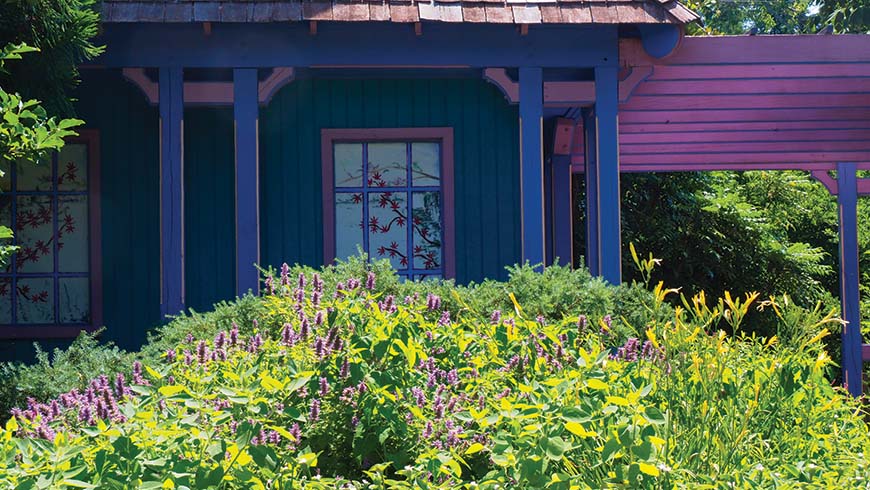
Carol McNeel
Carol has been a member for over a decade and has been an active participant in the JCRA's education programming throughout the years. Her home in Chapel Hill, North Carolina, is surrounded by a beautiful garden with JCRA plants well-represented. Carol is an important and generous donor to the Arboretum.
Heather Rollins
Heather is the marketing director for Fairview Garden Center in Raleigh, North Carolina. As a horticulturist and marketing specialist, her experience developing new concepts, marketing strategies, and experience in horticultural sales and marketing bring a different viewpoint than many nursery professionals.
Tom Skolnicki
Tom is the NC State landscape architect and has been a strong advocate to the university for the JCRA. Tom's role on the board is an ex-officio position, in addition to Frank Louws, Ph.D. We are happy to have another campus representative to provide guidance for the JCRA.


